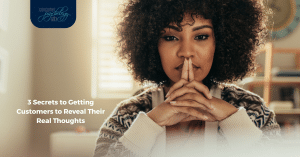In a world of big data, the internet-of-things, bots and AI, customer experience demands a shift in our approach to understanding our customers not as mere numbers, but as humans.
What’s on your customer’s mind?
According to IBM, 4 out of 5 customers say that brands do not understand them. More than ever, the human element in business is raising its hand for attention. Generation CX wants brands to know them and connect with them as individuals. But how can this be achieved if data is not driving the insights we need? Our solution to this quandary, is to talk to customers. One way of getting to know your customers, is to engage in conversation with your customers, and give them the opportunity to tell you exactly how they feel and why they feel that way.
Qualitative research methodologies provide a real opportunity to get more intimate with your customer, and get to know them – what motivates them, how they approach challenges, how they feel about brands, what makes them happy, what frustrates them. One of these methodologies, is focus groups. We unpack the advantages of using focus groups and guidelines to get the best out of your focus group.
5 Reasons for Focus Groups
Using focus groups, has five distinct advantages as compared to other methodologies geared towards amassing customer feedback, such as surveys, questionnaires and individual interviews.
-
Focus groups are about listening to what people say, feel & think
Participants (whether existing customers or representing the target market) are allowed to be human and become more just a number, a person with preferences, judgements, impressions and doubts. It is after all, the human that falls in love with a brand, follows it loyally and advocates it within their social and professional circle. We often find that participants of focus groups express their appreciation for being given the opportunity to share their views and thoughts. They feel valued and often leave with a stronger connection with the brand.
-
Group dynamics fuels the conversation with energy and insight
Instead of sharing singular views in isolated scenarios, focus groups place the participants in a safe, primed ‘ecosystem’, where their volunteered ideas fuel and inspire thoughts in the rest of the group. The discussion often remind some participants of similar experiences and they share within this “safe” space, views that may have not been voiced before. It is almost like belonging to a temporary exclusive tribe. They also know that they will not, in all likelihood, not connect with any of the participants again, so whatever is said, is okay. This is mostly achieved through the permission given to speak openly and the authentic interest in personal views and within these discussions (even controversial) that real insights in participants’ thinking, beliefs, attitudes and behaviour are discovered. These robust group discussions unearth insights.
-
Authentic questions get authentic answers
Focus groups keep research firmly in the human realm, often lost in quantitive questions such as what, where, when, how much, etc. Piercing, open-ended questions such as ‘But why exactly do you feel that way?” make the focus group participants pause, and often impel to look deeper into beliefs and perceptions. Focus groups provide the ideal platform to unpack the “why’s”, to deep-dive into the thinking, motivation and actions of consumers and to harvest game-changing insights.
-
An unstructured conversational space invites spontaneous insights
Every participant in a focus group is given a blank canvas and invited to delve into their true feelings, instead of being led by specific constraints of a questionnaire or survey. This might lead them to unveil the subconscious reason for an extreme like or aversion, or even send them off in a seemingly unrelated path that end up shedding a powerful new light on the consumer’s emotions.
-
It’s the perfect complement to end-to-end customer journey mapping
Using focus groups to unpack the customer’s journey, provide an unique opportunity to design the experience around addressing real pain points, solving challenges and creating surprisingly magical moments along the journey. The ability to address the non-obvious pain points and identifying the moments that matter, provides huge opportunities to differentiate customers’ experience.
Ready to start planning your next focus groups? Here are four guidelines that ensure the success of your focus group, making it crucial to partner with a highly-experienced and intuitive provider.
Choose your participants wisely
Typically 8 to 10 people are invited to a focus group. Because of the qualitative nature and deep-dive approach, far less participants are required. Only one group may not provide all the answers, but a representative sample of customers should be included in any structure of the research sample.
Having clear objectives for the focus group is the starting point and determines the type of participants to be recruited. The criteria for each focus group will be unique and highly dependent on the industry and project scope.
If the aim is to gain more insight in your customers’ experience, it goes without saying, that you need to recruit participants from your customer base.
Focus groups are also used where a glimse of competitors’ customer experience are required. The selection will then include a portion of your own customers as well as competitors’ customers. *The participants will generally not be told the reason for their specific selection nor is the client’s identity disclosed and the approach is more generic.
We strongly advocate the use of professional recruitment agencies. Armed with clear pre-determined recruitment criteria, these agencies take care of all logistics, leaving the researchers to do what they are best at.
Choose the right place, at the right time
While focus groups can take place anywhere (from a dedicated viewing facility with one-way mirrors, to an informal coffee shop), it is very important that the atmosphere is relaxed and comfortable. Clients observing the process through a one-way mirror may create some discomfort, but generally once the group discussion starts, the participants soon forget that the discussion is observed.
Also consider accessibility when choosing a venue – does it connect easily with main roads or highways, can participants get there via public transport, is there safe and sufficient parking?
In locking in a time for the focus group, you should also be mindful of the schedules of the participants, as well as the time of day in which they will be most relaxed, yet alert to give the most valuable insights.
Get a seasoned moderator in the room
A moderator facilitates the focus group discussion and is tasked to guide the group in a friendly, reassuring and neutral manner. He or she should have enough knowledge of the subject, for example, the field of customer experience, to probe appropriately. An authentic curiosity about and respect for the participants feedback will be coupled with clear communication skills and experience in facilitating groups. Almost at the top of the list of moderator qualities, is that this person should be neutral and exert unobtrusive control over the group.
Translate the feedback accurately for meaningful customer insights and recommendations
You nailed your focus group goals, you were very impressed with all the insightful feedback by the well-chosen group members, and the moderator outdid herself. So far so good. But none of this will mean anything without the well-honed eyes, ears and intuition of a professional to properly decode the focus group data. This is done by connecting the dots and extracting meaningful insights to understand what the next steps will be.
Partner with The Consumer Psychology Lab, a customer experience consultancy, in your quest to become more customer-centric and to design experiences that customers will love. We are passionate about customer experience, highly skilled in CX qualitative reviews and provide authentic insights from walking in your customers’ shoes.More than 10 years experience in qualitative research.






